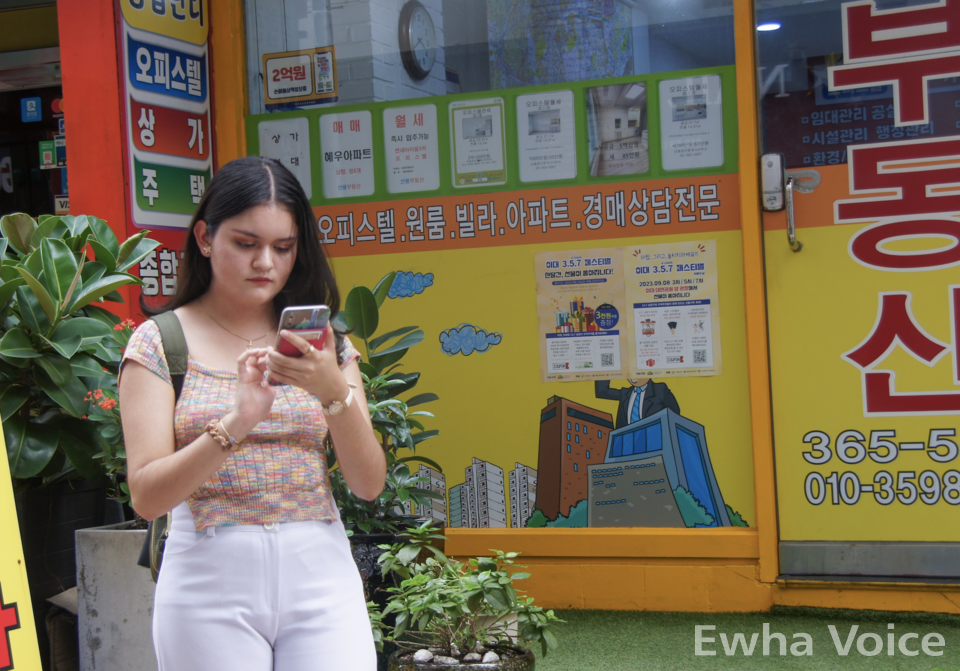
As of August 2023, the total number of international students living in dormitories accounting for all undergraduate, graduate, and exchange students is approximately 815 students. Each dormitory accommodates varying numbers of international students. Currently, there are 239 international students out of 2,143 total residents from E-House, 43 out of 1,330 residents from Hanwoori House, and 533 out of 770 students from I-House.
According to Ewha International Student Affairs, the number of international students itself is 1,913 out of 24,680 which includes 363 exchange students as of April 2023. As the figures show, dormitories cannot accommodate everyone who wishes to stay there, even if one is an international student. Thus, remaining students have to look for other options such as staying at apartments, shared houses, or a goshiwon, a single room with comparatively low rent, but limited private space. Searching for accommodations can be exhausting even for Korean students, as there are many conditions to consider. It becomes even tougher when one cannot speak the language fluently.
To make matters worse, resources related to housing are limited. Study in Korea, an official organization run by the South Korean government, provides international students with various information regarding universities, immigration process, and scholarships. However, a representative from the team shared that it does not offer any related support system. Then, how do international students find accommodations and what kinds of options do they have?
Juanita Herrera Padilla, a junior from Colombia majoring in consumer studies, has been living in Hanwoori House since March 2022. From applying to the dormitory to being assigned to her room, the entire process was taken over by the school, making it easier for her who had just arrived.
Herrera expressed that she feels glad to be in the dormitory as it provides security, a cafeteria with balanced meals, and a room with a nice view. However, she also finds the curfew, malfunctioning air conditioners and Wi- Fi, and hygiene issues inconvenient.
Due to limited capacity of dormitories, international students often struggle in their search for residences besides dormitories. Stephanny Peña, a graduate school student from Venezuela majoring in development cooperation, initially stayed in a shared house she found on Airbnb when she first arrived in Korea. Due to reasons of force majeure, the house owner could not continue running the place, so she had to unexpectedly move out. Thankfully, the owner helped her find a new place since Peña is not fluent in Korean.
“If dormitories cannot accommodate everyone, at least sending out emails with suggestions of places or related websites would be practical support,” Peña said. “Additionally, things to be aware of when searching for accommodations and how to avoid scams, along with information on how to report new address to the immigration office would be helpful.”
Fortunately, Peña eventually moved into the boarding house and has been staying there since this August. Although her current residence is recently renovated and affordable, it takes 25 minutes by bus to get to the campus which is further from her previous residence.
Searching for the best residence is not easy even for those who were on the lookout from the start. Rocha Prado Jynnah Sarahi, a graduate school student from Bolivia majoring in communication & media, has been living in a small studio apartment since this February.
Before starting her master’s course, Rocha lived in Daegu to take a Korean language course. Wishing to have her own place, she searched for accommodations in Seoul. As she could not stay in Seoul for long until she found the right place, Rocha browsed some places on a real estate application with an English option called Ziptoss. After signing up, she got a message from an agent who could speak English and he gave Rocha a tour to five places.
“None of them were great options, so I had to either pay more deposit or look for places distant from the campus,” Rocha said. “The last place had everything I wanted but the deposit was over my budget. Luckily, the agent was able to negotiate the price with the landlord and it was settled down to the amount I could afford.”
For international students seeking places to live, Rocha advised to seek help from Korean acquaintances, adding that it is almost impossible to find a property with the utmost condition, so students might have to let go of some standards.
Not every international student can receive help when searching for accommodations, which is why they frequently struggle to find one. It seems the current situation requires providing them with systems to help search for residences.

